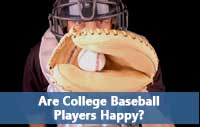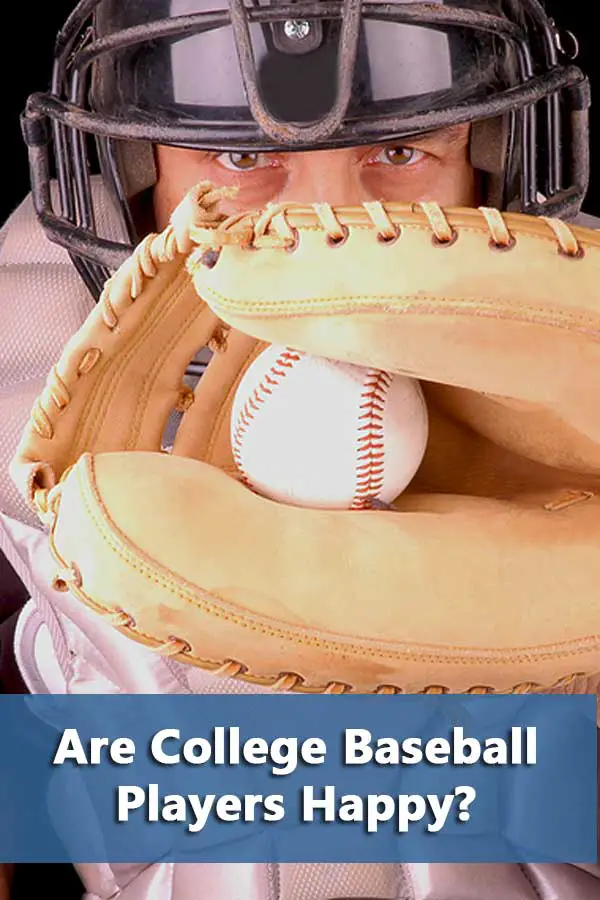 (The data is from 2010 but I think is still valuable today.)
(The data is from 2010 but I think is still valuable today.)
Do you know what you’re in for if you end up playing college baseball? Sure, you’ve talked to the coach multiple times and have done your overnight with the player. And you probably know about being able to do three things in college, study, play ball, and party but athletes only get to pick two. But do you really think you know what it’s going to be like?
According to the NCAA GOALS Study, about a quarter of baseball players find that the college baseball experience doesn’t meet expectations. D3 baseball players had the lowest percentage of male players saying that their initial expectation of their athletic experience at college was accurate. Of D3 baseball players, 68% said their expectations were accurate, compared to 71% at D2, and 80% at D1.
How accurate were your initial expectations of the
athletics experience at this college?
(% Responding Very Accurate or Mostly Accurate)
| Baseball | Men’s Basketball |
Football | All Other Men’s Sports |
Women’s Basketball |
All Other Women’s Sports |
| Division I | |||||
| 80% | 76% | 72% | 76% | 60% | 67% |
| Division II | |||||
| 71% | 70% | 77% | 78% | 67% | 67% |
| Division III | |||||
| 68% | 74% | 78% | 77% | 70% | 76% |
(from NCAA Presentation “Division I Results from the NCAA GOALS Study on the Student-Athlete Experience” )
Only half of the D2 and D3 players said they were glad that they made the choice to be at this school. In fact, less than half of D2 and D3 baseball players would recommend this school to a prospective student-athlete, the lowest among all the sports reported.
Satisfaction with College Choice
(% Responding Agree or Strongly Agree)
| Baseball | Men’s Basketball |
Football | All Other Men’s Sports |
Women’s Basketball | All Other Women’s Sports |
|
| If I could start over, I still would attend this school. | ||||||
| D2 | 36% | 42% | 48% | 52% | 52% | 56% |
| D3 | 45% | 55% | 57% | 62% | 65% | 70% |
| I would recommend this school to a prospective student-athlete. | ||||||
| D2 | 41% | 48% | 59% | 55% | 57% | 55% |
| D3 | 44% | 58% | 66% | 65% | 62% | 71% |
| I am glad that I made the choice to be at this school. | ||||||
| D1 | 67% | 62% | 59% | 68% | 48% | 70% |
| D2 | 49% | 51% | 59% | 60% | 63% | 63% |
| D3 | 51% | 63% | 67% | 69% | 70% | 77% |
(Compiled from Division I Results from the NCAA GOALS Study on the Student-Athlete Experience, Examining the Division III Student-Athlete Experience through the NCAA GOALS Study, Examining the Division II Student-Athlete Experience through the NCAA GOALS Study)
Apparently a lot of college baseball players are not happy campers.
Why? According to the survey, they were just as likely to visit the campus as players in other sports. However, academics as being the driving decision to attend the college was much lower than other sports, especially among D2 baseball players. Baseball coaches were much less likely to talk to the players about academics, only 32% among D3 baseball players.
Not surprisingly, baseball players averaged the lowest number of hours per week on academic activities of all the reported sports at all levels while putting in the most athletic hours of all sports except for FBS Football. Baseball players are also more likely to miss more classes than students in other sports and report more days away from campus for athletic competition than other sports.
Average Hours Spent Per Week In-Season
on Athletic Activities in 2010 (SA Self-Report)
| Baseball | Men’s Basketball |
Football (FBS/FCS) |
All Other Men’s Sports |
Women’s Basketball |
All Other Women’s Sports |
|
Division I |
|||||
| 42.1 | 39.2 | 43.3/41.6 | 32.0 | 37.6 | 33.3 |
| Division II | |||||
| 39.0 | 37.7 | 37.5 | 31.3 | 34.2 | 31.7 |
| Division III | |||||
| 34.8 | 30.8 | 33.1 | 29.2 | 29.8 | 28.9 |
(from NCAA Presentation “Division I Results from the NCAA GOALS Study on the Student-Athlete Experience” )
There’s plenty more and you should take a browse through the statistics yourself. The responses about coaches are very interesting.
So what does this all mean?
First of all, you need to remember that a lot of the negatives have to do with comparing baseball to other sports. So in many cases, well over half of baseball players are happy with their college baseball experience. It’s just that when you compare the responses to students in other sports, you realize they could be doing better.
But what about the other half of the baseball players? I don’t know.
The information I looked at were a series of presentations of data collected by the NCAA, not the data itself which is why D1 information is missing from the second table. It would be interesting to know if any of the other sports that are lumped into “All other” had similar responses.
If I had to guess, and it is only a guess, I would think the differences have something to do with a disconnect between academics and athletics in baseball compared to other sports. I’m not familiar with other sports so this is all speculation on my part. But I could see where playing three seasons a year, two of them independent of high school, would lessen the importance of academics in terms of being allowed to play. I would think that the role of the MLB draft and subsequent decisions of Junior College players to transfer to four-year institutions also puts the emphasis on finding a college to play at rather than looking at academics.
For baseball players and their families going through the recruiting process, paying more attention to the academics couldn’t hurt. After all, academics are the primary purpose of a college education.
Download PDF Version


3 thoughts on “Are College Baseball Players Happy?”